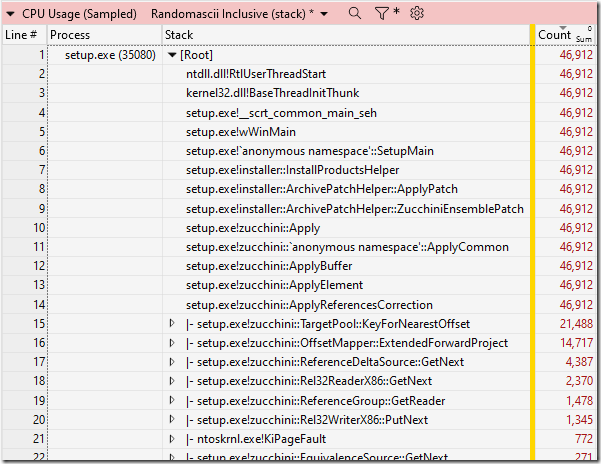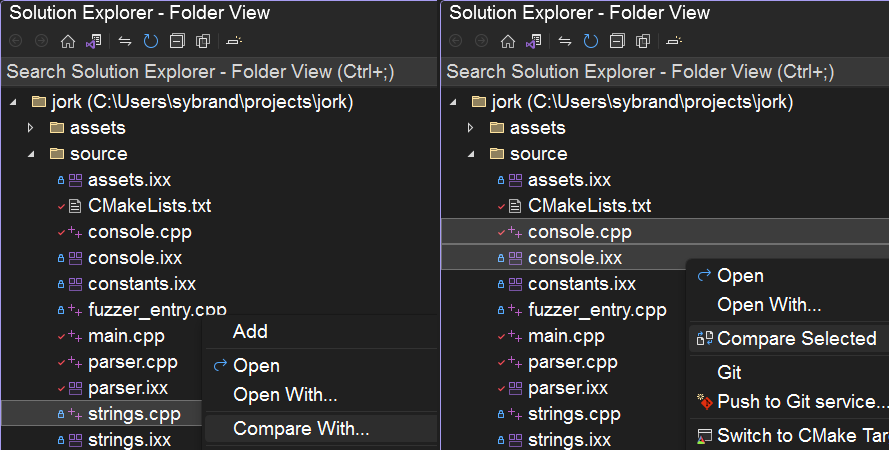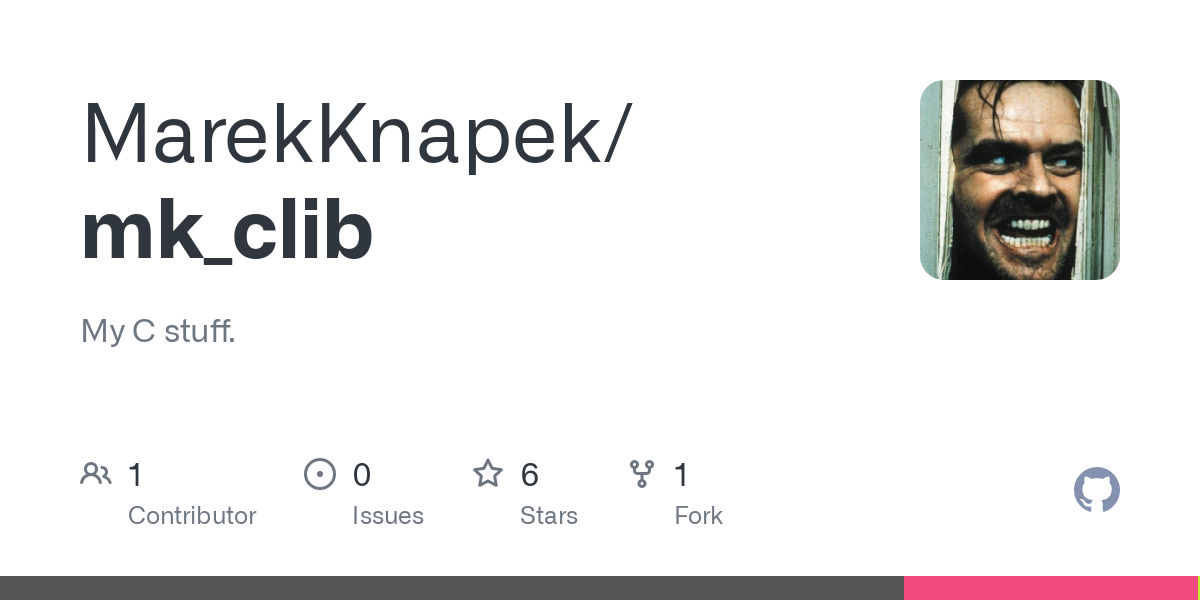You have stack buffer out of bounds write. On line 52 you declare h an array of 70 unsigned ints. On line 57 you store reference to such array. Later, on line 35 you write out of bounds, one element past end of the array. The _SPR_history[i] writes to _SPR_history[70]. Created an issue: https://github.com/X64X2/sh/issues/1
Marek Knápek
Level 33 C++ sourcerer. https://about.me/marek.knapek
- 9 Posts
- 21 Comments

 61·1 year ago
61·1 year agoDoesn’t depend on programming language but something with visual debugger. You know that stuff when you can see current line of your source code highlighted, press a key to step into, step over and so on. You can see values inside your variables. You can also change your variables mid-run right form the debugger.
Because you spend 20% of your time writing bugs and the other 80% debugging them. At least make it pleasant experience (no printf-style debugging).
Back in the day I was using Turbo Pascal, Delphi, Visual Basic, C#, Java, PHP with Zend, Java Script, today I’m using Visual C++.

 4·1 year ago
4·1 year agoSh1t already happened, but on the bright side, you learn for the next time. Some tips:
- Make clone of production environment into testing environment. Do stuff there, and after it is tested / verified, do the same in production. Emphasis on “do exactly the same”.
- Make regular automatic backup. From time to time, do a backup restore to another computer (VM) and verify that it is restored successfully and is actually usable.
- Poor man’s backup is automatic daily (hourly?) snapshots on BTRFS / ZFS / EXT4 filesystems or VolumeShadowCopy on NTFS filesystem.
- Before any
UPDATEdo aSELECTand verify the data you are modifying are the data you actually want to modify. - Use a transactions in form of
BEGIN TRANSACTION; UPDATE stuff; ROLLBACK;and observe the DB behavior, or see how many rows are affected. - Somebody has even moar tips, I’m sure. Please write them below.
Yes, I know this. It took me long time to figure this out. My entire life I focused on technical skills / programming / math / logic. As I deemed them most important for the job. I was like: “Hey, if you cannot program, why do you work as programmer (you stupido)?” Only few years ago I realized that even as programmer (as opposed to sales man) you really need those “meh” soft skills. And that they are really important and I should not call them “meh”. I’m very good at solving problems, improving product’s performance, memory consumption, discovering and fixings bugs, security vulnerabilities. But I’m very very bad at communicating my skills and communicating with people in general. I’m not able to politely tell people that theirs idea is bad, I just say “that’s stupid”. And I’m mostly/sometimes right (if I’m not 100% sure, I don’t say anything), but the damage caused by the way I say it is often inreversible. That post of mine about the job interview and CV was half joke and half reality. I just freeze/stutter when I’m asked something that is obvious because it is written I my CV. I’m immediately thinking “Did he not received the CV?” or “Did he not read it?” “Why the fuck is he not prepared for the call? Why are we wasting time asking me what should be obvious because I sent it in advance?” I’m more robot than human. Put me in front of problem and forget to tell me that it is impossible to solve … and I will solve it. But easy small talk … disaster. Communicating what the problem really was … disaster. Communicating how I solved it … disaster. “It was not working before and now it works fine, what the hell do you want from me now?” Yes, I’m very bad in team, in collective. I didn’t know the reason why, but since few years ago I know the root of the problem. It’s not that everybody around me is stupid and don’t know basic stuff (what I consider basic), but me unable to communicate with other humans.
The interview starts … the interviewer asks me “Tell me about yourself.” … I respond “Did you receive my CV? I put all important details about me … right there. What questions do you have about my past jobs?” The interviewer encourages me again to tell him about myself, my past projects, etc. … Me: Awkward silence. … Me to myself: Dafuq? Should I read the CV from top to bottom OR WHAT?
Yes, but (there is always a but) it does not apply if you implement off-line encryption. Meaning no on-line service encrypting / decrypting attacker provided data (such as SSL / TLS / HTTPS). Meaning if you are running the cipher on your own computer with your own keys / plaintexts / ciphertexts. There is nobody to snoop time differences or power usage differences when using different key / different ciphertext. Then I would suggest this is fine. The only one who can attack you is yourself. In fact, I implemented AES from scratch in C89 language, this source code is at the same time compatible with C++14 constexpr evaluation mode. I also implemented the Serpent cipher, Serpent was an AES candidate back then when there were no AES and Rijndael was not AES yet. The code is on my GitHub page.
std::vector::reserve + std::vector::push_back in loop is sub-optimal, because push_back needs to check for re-allocation, but that never comes.
std::vector::resize + std::vector::operator[] in loop is also sub-optimal, because resize default-initializes all elements only to be overwritten soon anyway.
This article’s author suggests push_back_unchecked.
I suggest std::vector::insert with pair of random access iterators with custom dereference operator that does the “transform element” or “generate element” functionality. The standard will have resize_and_overwrite hopefully soon.
Moar discussion:
https://codingnest.com/the-little-things-the-missing-performance-in-std-vector/
https://twitter.com/horenmar_ctu/status/1695823724673466532
https://twitter.com/horenmar_ctu/status/1695331079165489161
https://www.reddit.com/r/cpp/comments/162tohr/the_little_things_the_missing_performance_in/
https://www.reddit.com/r/cpp/comments/162tohr/the_little_things_the_missing_performance_in/jy21hgd/
https://twitter.com/basit_ayantunde/status/1644895468399337473
https://twitter.com/MarekKnapek/status/1645272474517422081
https://www.reddit.com/r/cpp/comments/cno9ep/improving_stdvector/
Another alternative to C++ exceptions (instead of return code) is to use global (or thread local) variable. This is exactly what errno that C and POSIX are using or GetLastError what Windows is using. Of course, this has its own pros and cons.
For this purpose I would search for Linux specific thing - a RAM based storage that receives data writes and even flushes/fsycs and then lazily writes them to HDD/SSD. There would be problem in case of power loss, but the gained performance… Unfortunately, I don’t know any such tool.

 3·2 years ago
3·2 years agoABI break when?
I know some unnamed big customers want ABI stability. But common … VS2015, VS2017, VS2019 and VS2022 all compatible with each other if used with new enough linker? They all are sharing pre-defined macro _MSC_VER 19xx and VC++ toolset version number 14.xx. That is too much of holding back progress on performance and correctness fronts. Eight years is enough.
Customers need to learn that they cannot rely on ABI stability of STL provided classes, cos guess what: The Holy Standard doesn’t specify any. Toolchain vendors do. This also applies to MFC/ATL/whatnot distributed as part of Visual Studio. Remember the GCC copy-on-write string ABI problem? We already have technology to help migrate between ABI versions: one is called COM, other is pimpl, other is version number as first member of struct or first function parameter. I bet there are many more out there.
Makes sense, how would you represent
floor(1e42) orceil(1e120)as integer? It would not fit into 32bit (unsigned) or 31bit (signed) integer. Not even into 64bit integer.
Think of advanced features of WinRAR not being accessible without valid licence key. Ehm, WinRAR distributes the same binary for both licensed and unlicensed users, unlocking the features with license key or with a crack (equivalent of
NOPingtheif). What if instead WinRAR distributed different binary for each licensed user, advanced features encrypted by per-user key. Crack or keygen would need to use some particular user’s binary with theirs license. Easily trackable. Or crack would need need to be applied once and then distribute the un-encrypted features / code.
Think of password protected access to something, anything. Instead of checking
if(password == some_constant){...}orif(hash(password) == precomputed_hash){...}you encrypt that something. The first variant has disadvantage thatsome_constantis stored inside your binary, thus password visible to anybody. The second variant … the same, hash of the password is stored inside the binary and could be brute-forced or rainbow-tabled. Both variants have the disadvantage, that there is a run-time check refusing access to some data, but those data are available in the binary anyway. Just open the program in debugger or in hex editor andNOPtheifout. With my approach the data is unreadable without the correct password. The app could not be convinced / persuaded to provide the data in any way without the password.

 3·2 years ago
3·2 years agoThis is true in real world also, not only in computer world or programming world. Think of steam engine, it enabled sooo much progress in other fields. Also invention of lathe and precision measuring and engineering. Before that, invention of “simple machines” such as pulley, bolt/screw, windlass, lever. The same in math, physics, chemistry and so on.

 26·2 years ago
26·2 years agoOversimplified:
- You have your current OS, text editor, compiler.
- You write code of the new improved OS using your current OS, text editor.
- You compile the code (text file), compilation yields the new OS or the new kernel (binary file).
- You replace (overwrite) your current kernel by the new kernel (current OS by new OS). This is possible, because while the OS is running it is in RAM not touching the disk.
- You restart.
- BIOS loads the new OS from disk to RAM and executes it.
- tada.wav
More questions:
- How to update BIOS? Answer: The same.
- How the first OS, text editor and compiler were created? Answer: The same. Using more primitive OS, text editor and compiler each step into the past. At the beginning there were toggle switches, punch cards, punch ribbon strips or similar.
The same style of question would be: How to create a hammer if in order to create a hammer you need a hammer? How was the first hammer created? Answer: By more primitive hammer, or something that is no hammer, but almost works as a hammer.
For more info read about bootstrapping compilers. Or trusting the trust by Ken Thompson.

 22·2 years ago
22·2 years agoIt is trade-off between convenience and security. With my approach stolen cookies are not usable from different computer / IP, the attacker needs additional work, he needs the victim computer to do the harm, his computer cannot do any harm. The downside is the user needs another log-in in case of his external IP changes. How often is it? Switch between mobile/WiFi. Otherwise … almost never … maybe 1x per day? I’m not proposing to log-out the user after IP change, I’m proposing to keep multiple sessions (on server) / auth cookies (on client) for each IPv4 or IPv6 prefix (let’s say /56).

 41·2 years ago
41·2 years agoAnd that JavaScript has access to cookies, that’s just a basic part of how web browsers work. Lemmy can’t do anything to prevent that.
Yes and No. Cookies could be accessed by JS on the client. BUT. When the cookie is sent by the server with additional
HttpOnlyheader, then the cookie cannot be accessed from JS. Look at Lemmy GitHub issue, they discuss exactly this. Lemmy server absolutely has power to prevent this.Again, Lemmy can’t do anything about that. Once there’s a vulnerability that allows an attacker to inject arbitrary JS into the site, Lemmy can’t do anything to prevent that JS from making requests.
I believe they can. But I’m not sure about this one. The server could send a response preventing the web browser to request content from other domains. Banks are using this. There was an attack years ago when attacker created a web page with i-frame in it. The i-frame was full screen to confuse the victim it is actually using the Banks site and not the attacker site. The bank web site was inside the inner i-frame, the code in the outer frame then had access to sensitive data in the inner frame. I believe there are HTTP response headers that instruct the web browser to not allow this. But I’m not sure I remember how exactly this works.
completely independent backend
Yes, it would be more costly, but more secure. It is trade-off, which one is more important to you? In case of chat/blog/forum app such as Lemmy I prefer cheap, in case of my Bank website I prefer secure.

 61·2 years ago
61·2 years agoOh I forgot another line of defense / basic security mitigation. If a server produces an access token (such as JWT or any other old school cookie / session ID), pair it with an IP address. So in case of cookie theft, the attacker cannot use this cookie from his computer (IP address). If the IP changes (mobile / WiFi / ADSL / whatever), the legitimate user should log-in again, now storing two auth cookies. In case of another IP change, no problemo, one of the stored cookies will work. Of course limit validity of the cookie in time (lets, say, keep it valid only for a day or for a week or so).







You can always take a look how for example Windows 3.11 and earlier did it for their *.rtf file format and their “write.exe” editor / viewer / renderer (if you want to call it that way).